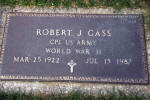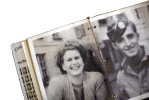
(courtesy of 'Theresa")
Grave marker for Robert J. Gass in Section 12, Site 7303
of the Calverton National Cemetery, Calverton (Suffolk county), New
York.
Robert enlisted in the at
New York City, NY on 28 October 1942 and was assigned to Company E,
508th PIR.
Pvt Gass was seriously
wounded in action on 3 July 1944 and evacuated to a field hospital.
On 10 October 1944 he was transferred to an unnamed hospital.*
He returned to the U.S. on
27 August 1945 and was discharged as a Corporal at Ft. Dix, NJ on 28
April 1946.
Cpl Gass' military
decorations include the Purple Heart, Combat Infantryman Badge and the
Bronze Service Arrowhead device awarded for participation in Normandy
assault.
* That hospital was at the
Bideford Army Air Force Base in England. While there  Robert
met a nurse named Lola Vowles. But that
fact, and their son, would not emerge for nearly 70 years. Robert
met a nurse named Lola Vowles. But that
fact, and their son, would not emerge for nearly 70 years. |
 Siblings
for 68 years, two men meet for the first time after being brought
together, in part, by Naples museum's website.
[Naples Daily News, Friday, August 21, 2015, Page 1, by
Hannah Marcus] Siblings
for 68 years, two men meet for the first time after being brought
together, in part, by Naples museum's website.
[Naples Daily News, Friday, August 21, 2015, Page 1, by
Hannah Marcus]
Brotherly Love
Steven Gass, left, and Leon Tetherton catch up Tuesday at a Fort
Myers beach condo. The long-lost brothers met for the first time
this week after Tetherton tracked down Gass using the internet.

The two brothers are
different.
They are both wearing blue shirts and khaki pants as they sit on
the screened in balcony on a balmy Fort Myers beach, but that's where
the similarities end.
Steven Gass keeps his salt-and-pepper hair medium-short, he smiles
sheepishly after he makes jokes he knows are funny (and he makes
plenty), waiting graciously for his peers to laugh first before he
chuckles along. His words fall out of his mouth with hints of a
New York accent, muddied a little by a move to Las Vegas a years ago.
Leon Tetherton is two years older. His silver hair is parted
to the side, and he wears it long. His English accent is quiet,
almost dominated by his tone --- a low, whispery growl that comes out
only after he places his left hand over the scarf covering a hole in his
throat.
They talk with ease, a comfort that usually comes from years of
learning the quirks and workings of another human being.
Maybe they should be comfortable with each other.
They're brothers, after all, in their late 60's and early 70s, ages where
life's patterns are set and personality traits have settled in.
Then again, it has been only 10 days since they met.
- - -
It was
Christmas Eve when Steven Gass received a letter in New York.
He and his wife, Lois, only recently moved back to the state from
Las Vegas, and Leon's letter came as a surprise to both.
It didn't spell out specifically that they were brothers, but
Tetherton wrote that he was contacting Gass for personal reasons.
When Gass emailed Tetherton on Christmas day he already knew
what the letter meant.
"I said to (Lois), I must have a brother in England, why else would
I be getting this letter?"
But Tetherton was hesitant, More than anything, he was
cautious about saying the word "brother" out loud or typing it when he
emailed back and forth with Gass.
"I was 99 percent sure he was it, but I didn't know how he was
going to receive it," Tetherton said.
He was prepared to offer proof --- his years of research to prove
that unbeknownst to Steven and the father that they share --- Robert J
Gass, who died in 1987 --- they'd been brothers for 68 years.
"I didn't even need to see the proof," Gass laughed, "I was with
open arms --- I couldn't stop thinking about his journey, and finally
getting to this point after all these years, and I wanted to do anything
I could to help." |
The fact that they
found each other this late in their lives is an amazing feat, they agree,
but not as amazing as how it all unraveled, or the way Tetheron's search
collided so carefully and perfectly with Steven Gass' hunt for a place
to lay his father's belongings to rest.
"It was dedication," Tetherton whispered, hand to his throat,
twinkle in his eyes, "combined with incredible luck."
- - -
 Robert
J. Gass was in his 20s and a highly trained paratrooper when he took
part in D-Day, June 5, 1944. Robert
J. Gass was in his 20s and a highly trained paratrooper when he took
part in D-Day, June 5, 1944.
He survived the initial invasion but saw only a month of combat
after being wounded by shrapnel in an explosion that killed a friend who
was directly in front of him. He was sent to the USAAF Base in Bideford,
England, to recover.
It was there that he met Lola.
She was an English nurse aiding him during his recovery, and to
her, his injuries were just another reminder how traumatic the war was.
She had brothers in the war. Her house had already been bombed and
destroyed.
"It was different then," Tetherton said, noting there was death
everywhere, and you clung to people.
"You don't know if you are going to live, and you're brought
together by that circumstance and then separated."
But Robert Gass recovered, and the U.S. government needed him. He
was reassigned and shipped away, he never spoke with Lola Diane Vowles
again, He never knew she was pregnant, He never knew she had
a son who was adopted shortly after his birth.
"My father's relationship with my birth mother goes back to love,"
Tetherton said. "That's a thing you rarely find in the hours of
war."
Steven
Gass had been carrying his father's belongings around for decades.
He grew up as his father's only child, sitting in a New York living
room with a man who occasionally shifted in his chair, scratching at the
shrapnel still in his leg.
After his father's death in 1987, all the things that accumulate
during a person's life had fallen into Steven's care --- war memorabilia
included.
"I wanted my father's things," he stopped and quickly corrected
himself, "I say 'my', and not 'our father' because at that point he was
just my father."
He continued: "I wanted my father's things to be put someplace he
would be remembered."
He donated old photos of his father to a website honoring
paratroopers*. Old black and
white photos of Robert are on the site: him crouching in his uniform, or
standing next to an unknown soldier. "Courtesy of Steven Gass
accompanies each photo.
Then in 2014, Steven Gass stumbled upon the Naples Airport Museum
of Military Memorabilia.
In donating his father's things to keep his father's memory alive,
Steven never knew he was planting clues, leaving a virtual breadcrumb
for Tetherton to find.
*[note: it was the 508th PIR site that Steven donated the
photos to.] |
"Planting the seeds,"
Tetherton said, "without knowing that I'd be looking to pick them up."
- - -
Tetherton
knew from a young age that he had been adopted, but England has strict
laws about adoption, making the details a mystery.
He had a good
life, a good upbringing, wonderful adoptive parents who loved him, he
said.
"As good as your adoptive parents are, you always know there is
another side of you." Tetherton said.
When he started his search in 2008, the laws still were stiff
surrounding what he was allowed to know. But with research, and a
little luck, he found his biological mother's family in 2009. She
had died just two years earlier, but Tetherton found he had two English
half-brothers.
One of them gave him a picture of his Mom.
About five years ago, adoption laws in England changed, and
Tetherton found access to more information. From scrawling on an
old sheet of adoption paperwork, he was able to piece together the name
of his birth father, his father's age and that he had been a paratrooper
in World War II.
Tetherton ran with it.
He trolled websites for years, coming up empty
until one night he stumbled upon the Naples Airport Museum's website
with the donated photos.
Instead of looking for Robert Gass, he needed to find Steven.
Endless searches and a few mouse clicks later, he'd found a Steven
Gass with a New York address. It was risky but he had to start
somewhere.
- - -
When the
brothers found out about each other, they stayed in touch.
First, they emailed, sending photos of wives, partners and
children. But eventually, that shifted into a once-a-week Skype
relationship.
"We were comfortable right away," Steven Gass said. "It's
just the way we are."
"It's in our genes," Tetherton added.
They corresponded for months and planned to meet in Naples for a
Sunday ceremony honoring World War II paratroopers at the airport's
museum --- the very same museum where their father's belongings are on
display.
During the planning, Steven sent over a photo his father kept from
the war, another black-and-white copy. Instead of posing with a
soldier, Robert Gass stood in uniform next to a woman, curly-haired and
smiling wide.
Steven Gass never knew who it was, just that it was from England,
1944.
But when Tetherton and his partner Liz Mackay lined it up next to
the photo his English half-brother had given him of his birth mother,
they knew it was her.
This photograph we already had and the one next to it had existed
for 70 years, thousands of miles apart," Mackay said. "And here
they are, finally, and they're lying next to each other on our kitchen
table." |





